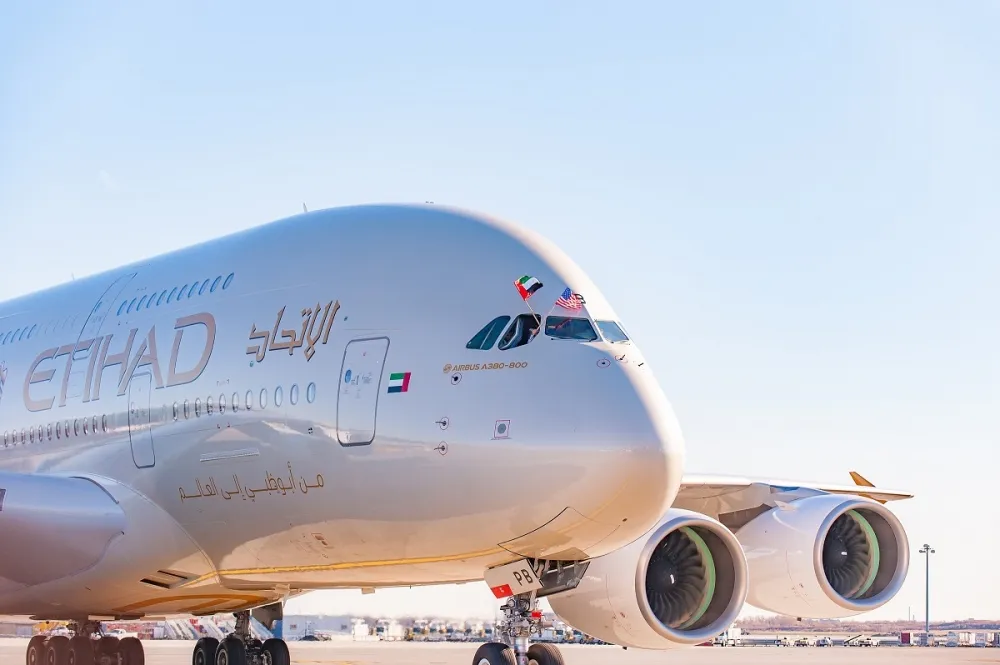
Etihad posts another massive loss in 2018
Mar 14, 2019

In 2018, Etihad Airways reported a significant financial loss, amounting to approximately 1.28 billion dollars. This downturn was attributed to various factors, including rising fuel costs, restructuring efforts, and challenges in its equity partnerships with other airlines. The company faced intense competition in the aviation sector, which further impacted its profitability. In response to these challenges, Etihad initiated a comprehensive transformation strategy, focusing on streamlining operations and enhancing customer experience. The airline aimed to regain financial stability while navigating a rapidly evolving market landscape, emphasizing the need for adaptability in the face of industry pressures.
In 2018, Etihad Airways reported another significant financial loss, continuing a trend that raised eyebrows across the aviation industry. The airline, based in Abu Dhabi, has faced numerous challenges over the years, from fluctuating oil prices to increased competition from budget carriers and other international airlines. This report delves into the factors contributing to Etihad's massive loss in 2018, the strategies the airline is considering, and the overall impact on its future.
Financial Overview
The financial results for Etihad Airways in 2018 showcased a concerning trend for the airline. The company reported a net loss of $1.28 billion, marking a dramatic increase from previous years. This loss was primarily driven by a combination of operational costs, lower passenger numbers, and increased competition.
Key Factors Behind the Loss
Several factors contributed to Etihad's massive loss in 2018:
- Increased Competition: The rise of low-cost carriers has significantly impacted Etihad's market share. Budget airlines have been able to offer competitive fares, attracting price-sensitive travelers.
- High Operational Costs: Etihad faced high fuel prices and maintenance costs, which added to its financial burden. The airline's operational efficiency has been questioned, leading to increased scrutiny from industry analysts.
- Global Economic Conditions: Economic fluctuations and geopolitical tensions in various regions affected travel demand. Economic downturns in key markets led to reduced passenger numbers, directly impacting revenue.
- Investment in Partnerships: Etihad has invested heavily in various partnerships and acquisitions, such as its stake in Alitalia and Air Berlin. While these investments were intended to bolster growth, they have not yet yielded the expected returns.
Strategic Responses to Financial Challenges
In light of these challenges, Etihad has begun implementing several strategic initiatives aimed at repositioning itself in the competitive landscape:
- Restructuring Plans: The airline has announced a comprehensive restructuring plan to streamline operations and cut costs. This includes reducing its workforce and re-evaluating routes to improve profitability.
- Focus on Core Markets: Etihad is shifting its focus back to its core markets in the Middle East and Asia, where it has traditionally performed well. By concentrating on these regions, the airline aims to enhance its market presence.
- Investment in Customer Experience: The airline is investing in improving customer service and onboard experience to differentiate itself from competitors. Enhancements in inflight services and loyalty programs are part of this initiative.
- Modern Fleet Management: To lower operational costs, Etihad is modernizing its fleet with more fuel-efficient aircraft. This move is expected to reduce fuel consumption and maintenance expenses.
Impact on Future Operations
Despite the financial setbacks, Etihad Airways is committed to its long-term vision of becoming a leading global airline. The steps taken in 2018 and beyond are critical for the airline's survival and growth. Key impacts on future operations include:
- Increased Focus on Financial Sustainability: With the losses in 2018, Etihad is prioritizing financial health, ensuring that all operational decisions are made with profitability in mind.
- Enhanced Competitive Strategies: The airline is exploring new routes and partnerships that align with its strategic goals while ensuring that it remains competitive in the ever-evolving aviation market.
- Long-Term Recovery Plans: Etihad is focusing on building a resilient business model that can withstand market fluctuations, ensuring that it can navigate future economic challenges more effectively.
Conclusion
Etihad Airways' massive loss in 2018 serves as a wake-up call for the airline, prompting a reevaluation of its strategies and operations. The challenges it faces are significant, but with a focused approach on restructuring and enhancing the customer experience, there is potential for recovery. The airline's commitment to improving its financial sustainability and operational efficiency will be crucial as it navigates the complexities of the aviation industry moving forward. As it adapts to the changing landscape, Etihad's future remains uncertain, but its determination to overcome these challenges will be key to its success.
Related Articles

Explore Thailand: The Best Islands to Visit for Paradise, Adventure, and Relaxation

The Ultimate Guide to the Best Islands in Thailand for Your Next Getaway

Do babies need passports? How to get a passport for a newborn

How to get a U.S. passport fast: here’s how to expedite the process

What is Mobile Passport Control: 5 reasons why you should use it

SENTRI vs. Global Entry: A detailed guide

Do you need a passport to go to the Bahamas? Let’s find out

Do you need a passport to go to Mexico? A detailed guide

Do you need a passport to go to Canada? We got the answer

Do You Need a Passport for a Cruise: An Essential Travel Guide

Booster Seat Requirements: All the Rules to Follow in Your Rental Car

What Are the World’s Most Powerful Passports, and How Does Yours Rank?

How to Take a Passport Photo at Home: A Helpful Guide

You've got to have heart! Southwest's new livery

Your opinion: Should water be free on low cost carriers?

Young women bolder than guys as solo travellers
